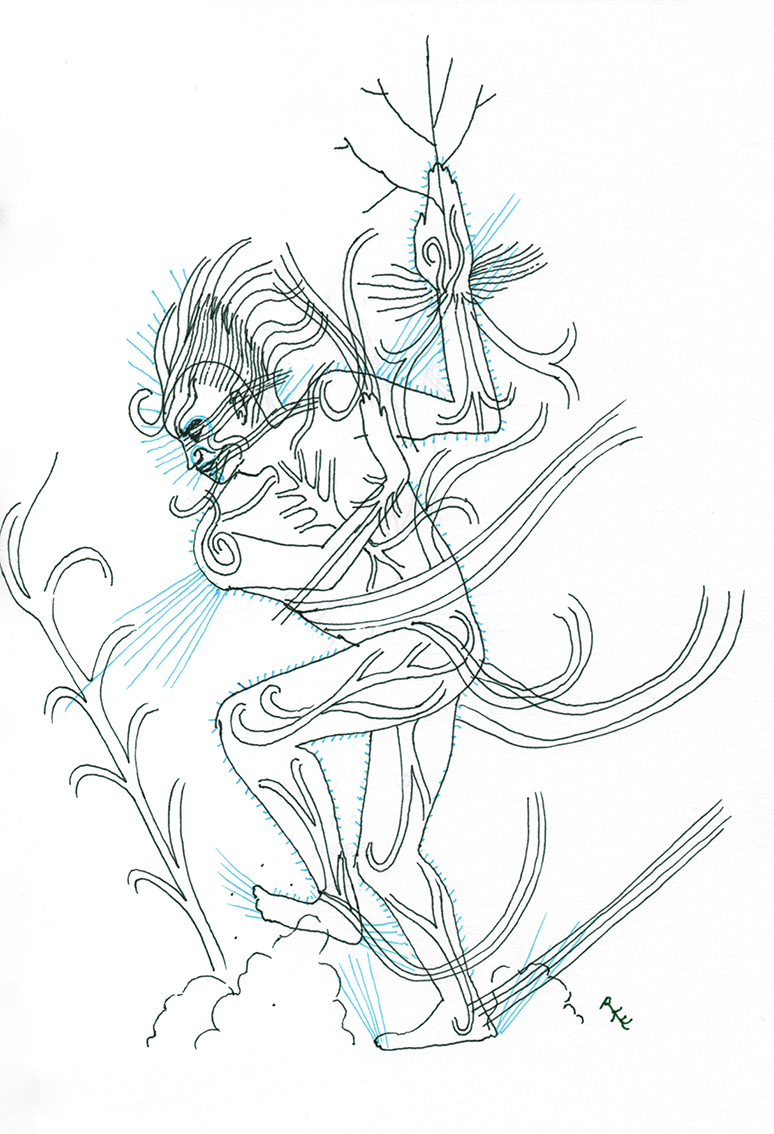Taking Sides: Urban Wandering as Decolonial Translation and Critique of Settler Colonialism
DOI :
https://doi.org/10.25071/1925-5624.40385Résumé
Résumé : Le colonialisme fragmente le sens. Dans cet article, où la fragmentation coloniale du sens est une question de traduction, l’auteur recourt à une méthodologie décoloniale dans le but d’examiner les enjeux politiques rencontrés lorsque l’on évolue d’un côté puis de l’autre de la frontière du colonialisme. Le travail est fondé sur un processus conscient d’errance ou de flânerie urbaine, que les Situationnistes appellent dérive. Deux études de cas pour théoriser le décolonialisme itinérant sont ainsi proposées. La première est une esquisse de la frontière militarisée entre les États-Unis et le Mexique. Le second exemple concerne Colombus Day (jour férié aux États-Unis) et la journée des peuples autochtones. Dans cette étude de cas, la traduction est une question d’ajustement, tout comme quelqu’un qui s’ajuste à une conversation, ou tout comme on ajuste une fréquence radio. La métaphore d’une traduction qui mène à un ajustement nous permet de répondre à des questions concrètes et pratique de traduction dans nos contextes quotidiens, comme dans les débats théoriques contemporains en traductologie.
Mots clés : traduction; colonialisme; méthodologie décoloniale; frontière; dérive
Références
Anzaldúa, Gloria. Borderlands/La Frontera. Aunt Lute Books, 1987.
Bandia, Paul. Translation as Reparation: Writing and Translation in Postcolonial Africa. Taylor and Francis, 2014.
Battiste, Marie and James Youngblood Henderson. Protecting Indigenous Knowledge and Heritage: A Global Challenge. University of British Columbia Press, 2000.
Buzelin, Hélène. “Unexpected Allies: How Latour’s Network Theory Could Complement Bourdieusian Analyses in Translation Studies.” The Translator, vol. 11, no. 2, 2005, pp. 193-218.
Chacaby, Maya Odehamik. “Crippled Two-Tongue and the Myth of Benign Translatability.” Tusaaji: A Translation Review, vol. 4, no. 4, 2015, pp. 1-11.
Debord, Guy. “Theory of the Dérive.” Situationist International Anthology, edited and translated by Ken Knabb. 1958. Bureau of Public Secrets, 1989, pp. 50-55.
Degraff, Michel. “Against Creole Exceptionalism.” Language, vol. 80, no. 4, 2003, pp. 834-839.
Degraff, Michel. ”Linguists Most Dangerous Myth: The Fallacy of Creole Exceptionalism.” Language in Society, vol. 34, no. 4, 2005, pp. 533-591.
Frye, Marilyn. The Politics of Reality: Essays in Feminist Theory. Crossing Press, 1983.
Geertz, Clifford. “From the Native’s Point of View: On the Nature of Anthropological Understanding.” Local Knowledge: Further Essays in Interpretive Anthropology. Basic Books, 1983, pp. 55-70.Gentzler, Edwin. “Translation without Borders.” Translation. 3, Spring, 2014. no page numbers.
Gordon, Avery, 2008, Ghostly Matters: Haunting and the Sociological Imagination. U of Minnesota P.
Guha, Ranajit. “The Prose of Counter-Insurgency.” Selected Subaltern Studies, edited by Ranajit Guha and Gayatri Spivak, Oxford University Press, 1988, pp. 45-86.
Hauser, Christine. “Blasting in Construction of Border Wall Is Affecting Tribal Areas.” New York Times, 11 Feb. 2020, updated 15 Feb. 2020, www.nytimes.com/2020/02/11/us/trump-border-wall-arizona-nativeamericans.html. Accessed 8 May 2020.
Khatib, Abdelhafid. “Attempt at a Psychogeographical Description of Les Halles.” Translated by Paul Hammond. Internationale Situationniste, no. 2, December 1958, www.cddc.vt.edu/sionline/si/leshalles.html. Accessed 8 May 2020.
Kohut, Heinz, “Introspection, Empathy, and the Semicircle of Mental Health.” The Search for the Self: Selected Writings of Heinz Kohut 1978-1981, edited by Heinz Kohut and Paul Ornstein. 1981. Karnac Books, 2011, pp. 537-567.
Kothari, Rita. “Grierson’s Linguistic Survey of India: Acts of Naming and Translating.” A Multilingual Nation: Translation and Language Dynamic in India, edited by Rita Kothari, Oxford University Press, 2018, pp. 116-132.
Kothari, Rita. “Translation, Language, Anthropology: Notes from the Field.” Interventions: International Journal of Postcolonial Studies, vol. 18, no. 1, 2016, pp. 43-59.
Massumi, Brian. Politics of Affect. Polity, 2015.
Niranjana, Tejaswini. Siting Translation: History, Post-Structuralism, and the Colonial Context. University of California Press, 1992.
Pratt, Mary Louise. Imperial Eyes: Travel Writing and Transculturation. Routledge, 1992.
Price, Joshua. “Whose America? Decolonial Translation by Frederick Douglass and Caetano Veloso.” TTR: Traduction, Terminologie, Rédaction, vol 28, no. 1-2, 2015, pp. 65–89.
Proctor, Robert N., editor. Agnotology: The Making and Unmaking of Ignorance. Stanford University Press, 2008.
Rafael, Vicente L. Contracting Colonialism: Translation and Christian Conversion in
Tagalog Society Under Early Spanish Rule. Duke University Press, 1996.
Rafael, Vicente L. Motherless Tongues: The Insurgency of Language Amid Wars of Translation. Durham: Duke University Press, 2016.
Rich, Adrienne. Blood, Bread, and Poetry: Selected Prose 1979-1985. WW Norton, 1994.
Romero, Simon. “Tribal Nation Condemns ‘Desecration’ to Build Border Wall.” New York Times, 26 Feb. 2020, updated 2 Mar. 2020, www.nytimes.com/2020/02/26/us/border-wall-cactuses-arizona.html. Accessed 8 May 2020.
Schiavone Camacho, Julia. “Re: Hola.” Received by Joshua M. Price, 10 of Jan. 2019. E-mail.
Simon, Sherry, and Paul St-Pierre. Changing the Terms: Translating in the Postcolonial Era. Orient Longman, 2002.
Smith, Danez. “It Doesn't Feel Like A Time To Write.” Buzzfeed, 23 May 2016, www.buzzfeed.com/danezsmith/poem-it-doesnt-feel-like-a-time-to-write-bydanez-smith?utm_term=.cpwj6bbdLY#.myO7yBBA2D. Accessed 31 March 2020.
Spivak, Gayatri Chakravorty. “Translating into English.” An Aesthetic Education in the Era of Globalization. Harvard UP, 2012, pp. 256-274.
Sullivan, Shannon and Nancy Tuana, editors. Race and Epistemologies of Ignorance. SUNY Press, 2007.
Wolf, Micaela. “The Third Space in Postcolonial Representation.” Simon and St-Pierre, pp. 127-45.
Téléchargements
Publié-e
Comment citer
Numéro
Rubrique
Licence

This work is licensed under a Creative Commons Attribution-NonCommercial-NoDerivs 3.0 Unported License.

